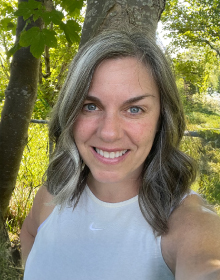Better late than never
After navigating perimenopause herself, Tina Marie Pomroy returned to grad school to ask why so many women are still left without support when it comes to their mental health.
Where are you from?
I am from St. John’s. I’ve moved out of the city, out of the province, and out of the country, but I keep coming back. My favorite place in St. John’s is the East Coast Trail. Within minutes I can be away from the noise, near the ocean, amidst the trails. It’s pretty special to have that in a city.
What do you enjoy doing for fun?
I love any class, event, retreat, or activity that is related to yoga, dance, or holistic wellbeing. I also love to hike and bike with my family. Hanging out on a beach with a crowd around a fire or sitting alone on a rock with a coffee is a long-time favorite. I also love going to dinner and live theatre or music.
Why did you decide to pursue a graduate degree?
I had already completed an MBA and had 20+ years’ work experience when I decided to change careers. I’d been through my own mental health challenges, and I supported a very good friend navigate grief as a suicide survivor. Through this, I realized I wanted to be able to help people live fully even through life’s struggles. In my late 40s, I decided to return to school to complete a graduate degree in counselling psychology.
Why did you choose Memorial University for your graduate studies?
I was married with kids, and this is where my family lives. The program was recognized as a good program, and as a Memorial University alumni already (I completed my MBA at MUN), I knew Memorial was a great school.
What is your research/thesis about? How do you describe your research to a general audience with no background in the field?
My research is in the mental health of perimenopausal women and their experiences with Newfoundland and Labrador healthcare. I think the title speaks for itself, but after going through perimenopause myself and speaking with numerous women my age and older, I realized there was very limited, if any, knowledge about and support for perimenopause mental health. Women were struggling through these years, and I wondered if this was a new phenomenon or was it always that way? And if so, many women seemed to be struggling, why was that? What was healthcare doing about it? So, I embarked on my thesis research and am near completion.
How would you describe your experience as a graduate student at Memorial?
I loved my experience completing my MEd in Counselling Psychology. As a (very) mature student, my perspective of school and learning was different from my past post-secondary experiences. I connected with many of my professors and practically ate the material I was learning. I engaged in discussions more than ever before. Part of my program was during the COVID-19 pandemic, and, like everyone, we had to pivot and change how the program was delivered. Nevertheless, I had a wonderful learning experience, and my professors adapted exceptionally well, making it easy for us students.
What scholarships or awards have you received?
I received the CFUW (Canadian Federation of University Women) Edith Creighton Scholarship for $2,000.
Have you faced any challenges in life that you’ve overcome to pursue graduate studies?
I overcame a lot of personal barriers to complete my first two degrees. However, this graduate degree was different. The challenges were less personal and more external. For example, the COVID-19 pandemic hit just as I was beginning my thesis research, delaying the process. I had a school aged child still at home, and, like all parents, I attempted to teach her at home. It was fun but exhausting! As I navigated my thesis research, my two grandchildren were born and I helped quite a bit when each was born, I returned to work full-time, my oldest daughter was sick for several months while I took on a greater role caring for my grandchildren, and my ageing parents sometimes needed my attention. Overall, it was just life, and I revisited my plan to finish my thesis more times than I can count, but it did delay my graduation time.
What career path are you interested in pursuing after graduation?
Counselling will soon be a regulated profession in Newfoundland and Labrador, and I intend on becoming a registered counsellor. I have a background in business and leadership, so I’d like to eventually bring those skills into the mix; however, right now, I’m excited to begin working with counselling clients, learn from supervision, and continue training to specialize in trauma, depression, anxiety, and grief.
What advice would you give to current or future graduate students?
There is no one correct path to complete a graduate degree. The path may not look like the plan, but the process is priceless.
Anything else you would like to share?
It is important to have appropriate support systems while completing graduate research. There will likely have to be trade-offs, some of which may be difficult. Friends and family can be a source of support, but they may not understand. My thesis supervisor provided so much validation about what I was going through, which really helped me finish.
Become a graduate student at Memorial. Apply online today!
